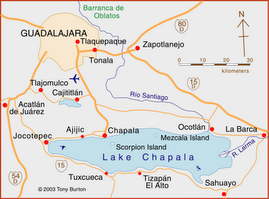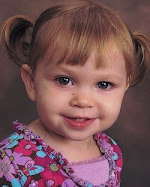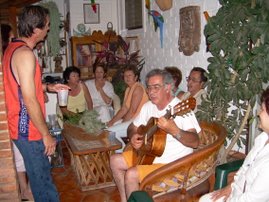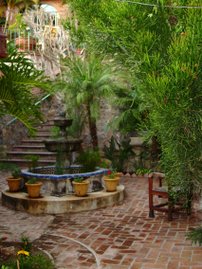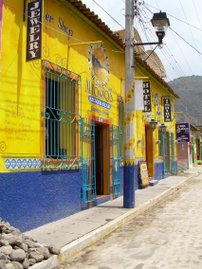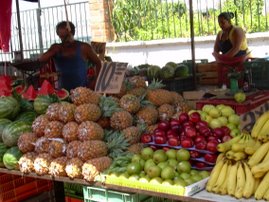 Fall is here, and the rains have just about stopped, leaving sunny days and pleasant evenings. Yesterday, we took a trip to Zapopan, just northwest of Guadalajara with our friends Steve and Sue, and Paul and Jeanne. We all drove into Guad. in our car, then took the subway and a city bus to the center of Zapopan. Pictured above is the Basilica built by the Franciscans in 1690. You can see the ornate interior of the basilica, with the virgin of the immaculate conception of Zapopan on the altar, gold leaf adornment, and beautiful fabric hanging throughout. We saw a number of Mexicans approaching the altar on their knees.
Fall is here, and the rains have just about stopped, leaving sunny days and pleasant evenings. Yesterday, we took a trip to Zapopan, just northwest of Guadalajara with our friends Steve and Sue, and Paul and Jeanne. We all drove into Guad. in our car, then took the subway and a city bus to the center of Zapopan. Pictured above is the Basilica built by the Franciscans in 1690. You can see the ornate interior of the basilica, with the virgin of the immaculate conception of Zapopan on the altar, gold leaf adornment, and beautiful fabric hanging throughout. We saw a number of Mexicans approaching the altar on their knees.
Zapopan is a fun place, with one of the largest public plazas in Mexico, lots of street vendors, and plenty of places to eat. They have an interesting museum about the Huichol Indians, and a famous mural in the municipal building which features portraits of socialist heroes, Ho Chi Min, Karl Marx, Fidel Castro, and Vladimir Lenin, along with a couple of obligatory naked people:
 We finished off the day with dinner in a Greek Restaurant, then walked through the well-lit plaza and figured out our way back on public transportation.
We finished off the day with dinner in a Greek Restaurant, then walked through the well-lit plaza and figured out our way back on public transportation.Not too much of great excitement is occurring at the moment; we are in somewhat of a routine with our Spanish lessons and my ESL teaching twice a week. My students are working very hard, and are progressing rapidly. Most Mexicans know at least some English anyway, because they are exposed to English words frequently. But I am finding that their knowledge of English is random, and that they have a lot of trouble with pronunciation, as we do with Spanish. For example, there is no sound for our "V" in Spanish, which is undifferentiated from "B." They also have no sound for our "TH." In Spanish, the letters always are pronounced the same, so English drives them crazy. Many of the students are working in jobs which bring them in contact with English-speaking people, so they are motivated to improve their English to improve their careers.
I love getting to know them and learning about their lives. It's a very low-pressure environment, with no grades or graded homework. I give them homework, and some do it. I give them a quiz, but call it "practica," so they won't feel nervous. We play lots of dumb games I make up and we make quite a bit of noise. They laugh at my feeble Spanish pronunciation, but appreciate my efforts. I told them that my goal is to have them talking like gringos, which they find hilarious!
We are participating in a Great Books discussion group, which meets every two weeks and is very interesting. The people who are in this group are amazing, and the discussions are quite challenging. Their expertise is in many different fields, and they are able to teach us lots that we didn't know. Last week we read "The Great Inquisitor," by Dostoevsky, and had a wonderful discussion about faith vs. doubt. One of the group participants was a Catholic monk for ten years, and he brings a unique perspective. He and a Jewish friend have been recreating hypothetical dialogs between real Christian and Jewish thinkers to debate theology and the issues of the day. So far they've done dialogs in the first century AD, the fourth century, and, the one I saw, in the eleventh century, right after the first crusade. These guys are amazing, and are planning another dialog to take place around the time of the Protestant Reformation, then publish their dialogs.
As I mentioned before, I have been attending a local writers group, and will be reading my poetry for the first time on Friday. Many of the other writers in the group have published extensively and know a lot about the craft of writing. We sign up to read, and have as much at ten minutes. The moderator then calls for comments, and we react to the piece which was read. Most people read fiction, although there are other poets and essayists as well. The comments are usually constructive, but very honest. I am planning to thicken my skin before Friday. I have never really worked on my poetry in this fashion, and I have never read any publicly. But, I hope to improve. Here is one of my poems I plan to read Friday:
Foreigner, Walking
Stepping out into the surprising heat
Whitening my skin, it seems
As I navigate the uneven stones
Of our
Past a dark-skinned boy
Drinking Coke and mixing sand
Into cement. “Hóla,” I offer,
And he responds more lyrically.
Mangos fallen to the street
In the overnight rain
A flat-faced, indigenous madre
Picks them up, bruised and unripe alike
Into a faded nylon mesh bag
Another beautiful “Buenos Días”
Enunciated slowly, carefully
With a slight smile.
Passing an arborreta, glancing into
The dark space
Lined with small packages of snacks,
A cooler with soda, juice
Milk and cerveza.
A small boy, ebon hair,
Busy red fingers dancing
Counts berries into small bags,
His grandmother cutting melon
At a white, plastic table,
Teen boys with greasy hair,
Gold chains, swagger by, ignoring.
A man with a leather lined face
Pushes an incongruously white
Straw hat up his forehead
As he leans intently, under
The open hood of a twenty year-old
He waves and smiles,
As I trudge past,
Exercising,
No place to be,
Plenty to eat,
Here by choice,
And grateful,
But foreign.





















